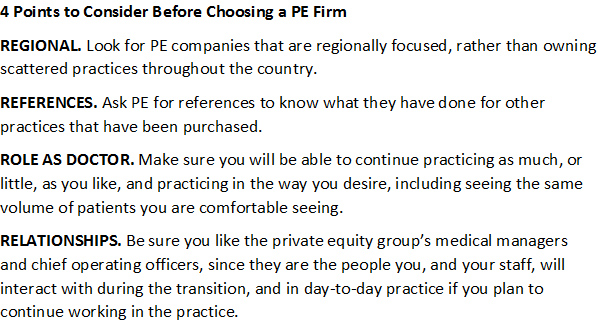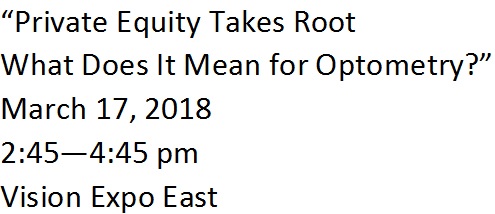March 14, 2018
Private equity offers great opportunity–and potential downsides–for optometric practice owners. Since selling my multi-location practice last year, I have been satisfied with the results, but I know that’s not necessarily the case for all doctors who sell to PE. Part of the reason for my success is careful research of PE firms prior to making the sale, including asking essential questions about what I wanted for my patients and family.
>>Click HERE to register for the free VEE event Private Equity Takes Root: What Does It Mean for Optometry?>>
Think About Long-Term Health of Practice
About four years ago, I realized I would have to shift to preserve the long-term profitability and stability of my practice. Specifically, I was troubled by the proliferation of online refraction, and easier-than-ever access to low-cost glasses and contact lenses online, and the impact of managed care. Our reimbursements for many of the services we delivered had gone down, while I found myself spending more time on data entry, thanks to the need to implement electronic health records. With children, who also are optometrists, and whom I wanted to leave my practice, it seemed a change in long-term strategy was needed. I wanted to be sure any decision I made would also be right for my children.
 Make a List of Viable Options
Make a List of Viable Options
• A private equity partnership, in which I retained partial ownership of my practice.
• Creation of my own optometric alliance, backed by private equity money, to realize greater savings on inventory and instrumentation purchases, and to obtain contracts with Accountable Care Organizations.
• Sell to an organization like MyEyeDr., or another private equity company, which enables the full sale of the practice with the option for the doctor to continue working in the practice.
 Decide Based on What’s Best for Both Patients & Your Own Family
Decide Based on What’s Best for Both Patients & Your Own Family
I opted to sell to private equity, in the form of MyEyeDr, because I felt that the organization would allow my family to maintain the level of patient care we strive for, while lessening the business burden on us of the administrative duties of staff, billing and marketing. I knew other practice owners, who had sold to this organization, and they were happy with the outcome. In addition to getting personal references, I researched the kinds of inventory deals that being part of the organization would allow, such as for frames and contact lenses, and the resources available for training and managing staff.
It was also important to me that we would no longer have to worry about the day-to-day maintenance of our technology systems, like our EHR, and the management of our financial records.
I am no longer CEO of the practice, though I continue to be involved in clinical direction. I plan to use the additional free time to lecture and create new continuing education programs. When you sell to a private equity organization, your world changes because you no longer have responsibility for the office’s daily operations.
Fortunately, I was able to keep the majority of my staff, but now they have added support for their roles from the practice’s new owners. This is a change that has allowed us to provide a more efficient, improved patient experience, and the high level of care our patients have come to expect.
Is selling to private equity a possibility for you? What are your key questions and concerns about selling to a PE firm?
>Click HERE to register for the free VEE event Private Equity Takes Root: What Does It Mean for Optometry?>>
Jack Shaeffer, OD, was the owner of Schaeffer Eye Center, which he sold to MyEyeDr last year. To contact him: drschaeffer@schaeffereyecenter.com


























